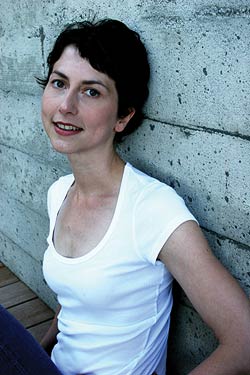Chick lit! We need more chick lit! Or a scathing dot-com exposé of Seattle’s boom-and-bust cycle—the insta-millionaires, the yellow Ferraris, and the chuckling repo men who took it all away when the Nasdaq crashed. Write what you know, right? That’s the usual advice given to young first-time novelists like MacKenzie Bezos, who—married to the founder of Amazon.com—probably has some inside tales of cyberhubris and humiliation to tell. It’s also advice she ignored.
In The Testing of Luther Albright (Fourth Estate, $23.95), she instead burrows into a nonaffluent, nonglitzy family in Sacramento, Calif. The book has been generally well reviewed, and not just on Amazon. Last month, our reviewer Summer Block wrote: “As Elliot pushes his father to react in some way, Luther’s passivity and paranoia gradually crack the foundation of his family. Turning the pages, the atmosphere is tense and oppressive.” Chick lit it’s not.
“It’s such a recent boom though, isn’t it?” Bezos asks of Bridget Jones and her many, many sisters. “Maybe I was helped by the fact that I started [the novel] eight years ago—am I missing something? I basically started this one in earnest in 1997, with a little time off for babies. I rewrote it so many times . . . and tried out a lot of differing points of view. So in some respects, I guess I wrote three or four novels—but none that I would’ve tried to publish.”
Sitting over coffee downtown recently, Bezos explained, “I always wanted to be a writer, ever since I was a little kid.” Today, the friendly Eastside resident only dabbles in book groups and isn’t part of any local literary clique. “I haven’t been to nearly as many readings in the last few years as I first did when I first moved to Seattle. Probably because I have small kids, I don’t get out so much at night.” And if she did, looking like a college freshman, she’d still be carded.
Bezos moved to the Northwest in 1994. Since then, she’s successfully resisted—or been insulated from—most of the current trends in pop fiction: no chick lit, no short fiction in trendy magazines, no writing in coffee shops on a laptop. (Granted, not everyone has the freedom to woodshed on one massive project.) “Even in college, I couldn’t manage to write a short story,” she says. “I’m not much of a short-story reader, either. I’ve always been interested in long fiction. I’m not particularly drawn to [family novels] so much as any kind of close-up scrutiny of interpersonal relationships—in particular, emotional secrecy. It could just as much be in work relationships as family relationships. Those issues of miscommunication and misunderstanding . . . how small bits of secrecy can wreak such huge effects.”
But don’t expect Luther to be some kind of dysfunctional family roman à clef. Of her undergraduate days at Princeton, where she studied with Toni Morrison, Bezos recalls, “I used to hear, ‘Write what you know.’ And after a while, it started to seem to me that what people really meant by that was—write what you know emotionally. Jane Smiley is a great example: So many of the things she’s written about are jobs she’s never had, places she’s never been. It has to do with the emotional core of things.” Of repressed middle-aged narrator Luther’s voice, she adds, “It couldn’t be more alien from my experiences.”
She concludes, “That is one of the things that surprised me. . . . When I had this family story . . . I just assumed when I started that I would end up writing primarily from the daughter’s point of view. And not only did I not write from her point of view, but I cut her out of the book altogether—because she was so dull!” So much for the chicks.








